Established by the UK Parliament in January 2023, ARIA is a research and development funding agency sponsored by the Department for Science, Innovation and Technology. Its goal is to foster technological breakthroughs that benefit everyone. The ARIA Synthetic Plants programme, led by Programme Director Angie Burnett, aims to develop major crops that are more productive, resilient, and sustainable.
The Oxford Plastid Transformation for an Improved Sustainable Economy (OPTIMiSE) project seeks to revolutionize plastid engineering for sustainable agriculture. Professor Francesco Licausi from the University of Oxford describes it as "a fantastic opportunity to showcase how DNA design leverages natural plant evolution to guide crop improvement in the context of climate change."
The OPTIMiSE project involves collaboration between researchers such as Professor Steve Kelly and Professor Francesco Licausi from the Department of Biology at Oxford, alongside Professor Chris O’Callaghan from the Nuffield Department of Medicine and industry scientists from Wild Bioscience Ltd. The focus is on making crops more productive and resilient amidst increasing demand and climate change pressures.
A significant aspect of this research is its focus on chloroplast genomes rather than nuclear ones. Although smaller in size, chloroplast genomes are crucial for processes like photosynthesis and stress tolerance. Traditionally inaccessible through plant breeding methods, OPTIMiSE aims to utilize cutting-edge DNA assembly technology developed by Professor O’Callaghan’s lab to create precision chloroplast genomes using naturally occurring genetic variants.
By integrating these designed chloroplast genomes into plants such as potatoes and wheat, which are among the most consumed crops globally, researchers aim to significantly enhance productivity and resilience under challenging conditions like drought or extreme heat.
Professor Licausi notes: "This is a fantastic opportunity to showcase how DNA design leverages natural plant evolution to guide crop improvement in the context of climate change." The project focuses initially on potato plants with synthetic chloroplast genomes meeting international regulatory standards for precision bred organisms rather than genetically modified crops. The plan includes extending this technology to wheat.
Dr Ross Hendron, CEO of Wild Bioscience Ltd., expresses enthusiasm about partnering with ARIA and Oxford University: "We’re excited... This blending of government-backing, world-leading science, and frontier startup innovation represents the ideal collaboration model for driving agricultural breakthroughs for the UK, and ultimately, the planet."
Professor Steve Kelly highlights that this approach aligns with international definitions on precision bred organisms: "We are pioneering a new way to turbo charge the process of combining this natural variation in the same plant using a regulation-friendly approach – unlocking a new way to help achieve a global revolution in sustainable agriculture."
If successful, OPTIMiSE could transform agriculture by creating enhanced potato and wheat varieties better suited for changing climates. With support from Wild Bioscience Ltd., these advancements have potential rapid translation into real-world applications globally.
Further information can be found on the ARIA website.

